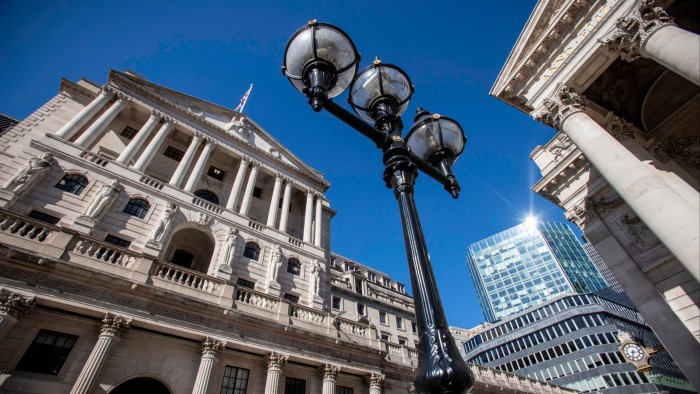Unlock the Editor’s Digest for free
Roula Khalaf, Editor of the FT, selects her favourite stories in this weekly newsletter.
The Bank of England has warned that financial markets could endure “a further sharp correction” even after the steep sell-off triggered by Donald Trump’s announcement of sweeping tariffs last week.
Officials at the central bank on Wednesday said “the probability of adverse events” had risen and the UK’s open economy was particularly exposed to the financial market turmoil stemming from the US president’s trade war.
“The global risk environment has deteriorated, and uncertainty has intensified . . . the probability of adverse events, and the potential severity of their impact, has risen,” the BoE’s Financial Policy Committee said after its quarterly meeting.
“The risk of a further sharp correction being triggered had risen due to global developments”, the BoE said, adding that risk premia remained “relatively tight in historical terms”. It added that “a major shift in the nature and predictability of global trading arrangements could harm financial stability by depressing growth”.
The comments came after Trump’s so-called reciprocal tariffs came into force at midnight in Washington on Wednesday and as global stocks continued to trade lower, joined by government bonds led by a sell-off of US Treasuries.
The sell-off was mirrored in the UK, where government bonds have been under pressure in recent months because of concerns about the UK public finances.
Yields on 30-year gilts climbed to just over 5.5 per cent on Wednesday morning, exceeding an earlier multi-decade high set in January to trade at levels last seen in 1998.
The yield on the 10-year gilt, which moves inversely to prices, also advanced, trading at 4.67 per cent, while the pound declined against the euro.
Gilts were being affected by the ripple effects of a “sell America” narrative driving US asset markets, said James Smith, UK economist at ING. This was partly because gilts are generally sensitive to movements in US Treasuries, he said.
In addition, “there are concerns about the large amount of issuance over the next 12 months and the elevated UK deficit,” Smith added. “There are already some fiscal concerns and at times like this that might make the UK gilt market more vulnerable.”
The US reciprocal tariffs include a 104 per cent levy on China that will slash trade between the world’s two largest economies and already led to retaliatory import taxes by Beijing.
The BoE warned that increased levels of government borrowing left the financial system vulnerable to “sharp increases in government bond yields” that “could crystallise relatively quickly, particularly if accompanied by rapid capital outflows”.
However, the central bank said hedge funds had so far been able to cope with sharp falls in markets, with many de-risking their investment portfolios ahead of Trump’s tariffs announcement last week.
“While the margin calls faced by funds following April 2 had been significant, they had so far been able to meet them without taking actions which would further amplify the market liquidity,” said the BoE.
Banks have asked hedge fund clients to stump up more money as security for their loans because of falls in the value of their holdings, leading to the biggest so-called margin calls since the Covid pandemic, the Financial Times reported last week.
Failure to meet a margin call can trigger a negative feedback loop where hedge funds are forced to sell assets to secure liquidity, which can lead to further declines in the market.
Recommended
But the FPC said de-risking ahead of April 2 had meant some hedge funds “were less impacted by subsequent price volatility”, adding that markets “remained orderly” and there was “no evidence of stress or amplification in non-bank financial institutions active in UK markets”.
British banks “remained well capitalised and had high levels of liquidity”, the BoE said, adding that lenders “reported that large corporate demand for credit had declined, whilst availability remained broadly unchanged”.
But the central bank said “a reduction in global co-operation . . . could reduce resilience” and pointed to particular risks at heavily indebted companies and hedge funds using high levels of leverage in their trading of government bond markets.
The debt used by hedge funds to trade in UK sovereign bond markets had risen from £4bn at the start of last year to £61bn in March, “with much of the borrowing concentrated in a small number of funds”, the BoE said.



